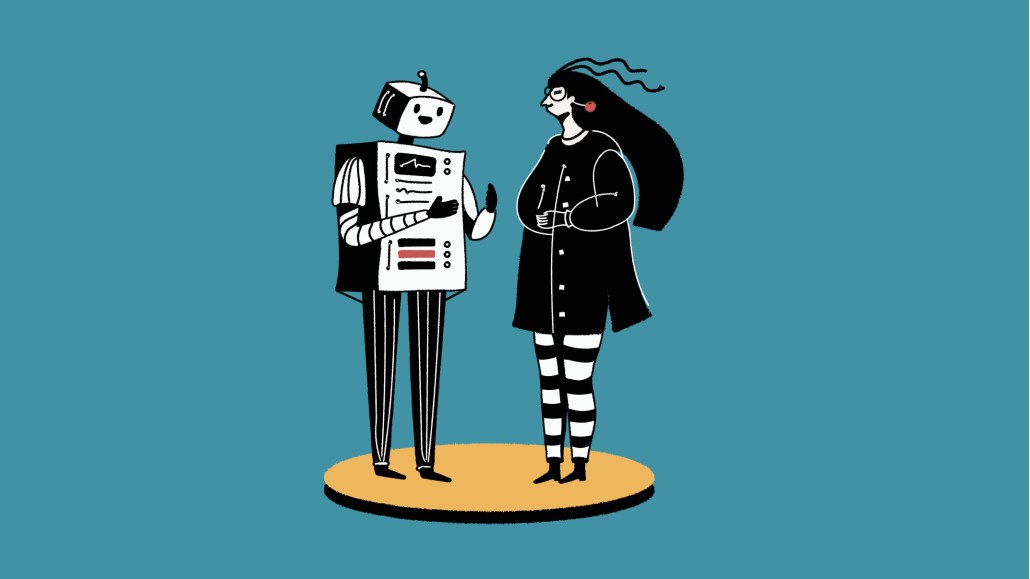Secure your place at the Digiday Media Buying Summit in Nashville, March 2-4
Why Unity Technologies is leaning into AI as economic headwinds pick up

As the hype around artificial intelligence reaches a fever pitch, executives at Unity Technologies are finding themselves at the center of the storm. They believe that AI can multiply revenues across all facets of their popular game engine — including Unity’s in-game ads business. In fact, they say it already has.
Over the last few weeks, leaders from across the gaming industry have spent hours extolling the virtues of artificial intelligence for game development, with Nvidia’s stock price skyrocketing on the back of a May 24 earnings call brimming with AI hype. As one of the largest gaming companies listed on New York Stock Exchange, Unity Technologies also leaned into AI during its May 10 earnings call, with Unity CEO John S. Riccitiello stressing Unity’s “competitive advantages in and around AI.”
Earlier this week, Digiday caught up with Ryan Peterson, Unity’s vp of accelerate solutions, to talk about his company’s plans to use AI tech to improve its ad offerings and game development tools.
This conversation has been edited and condensed for length and clarity.
On the ways Unity is already leveraging AI technology for its advertising offering

Ryan Peterson:
What people don’t realize is that AI already has scaled Unity Ads. AI powers our entire ads platform — frankly, that’s why we beat our last earnings round. What happened is that ChatGPT captured everyone’s imagination, but we’ve had AI teams and a head of AI for the last, like, eight years at Unity. I use AI all the time in our work. So we’re leaders in machine vision; we’re leaders in simulation; we’re leaders in perception technology and we’re also leaders of adopting AI to drive our ads business.

Digiday:
At the moment, Unity’s ad offerings are mostly located inside mobile games, which could be a challenge for the company as it looks to scale up and start offering the premium gaming inventory that brands covet. But the numbers and potential scale behind Unity’s advertising inventory are already impressive: 1.8 monthly active creators used Unity Editor in 2022, and over 50 percent of augmented reality apps and virtual reality experiences are currently made with Unity, according to statistics shared by Unity Technologies. Last year, gamers spent an average of over 5 billion hours per month playing games made with Unity.
On how AI can make Unity’s real-time development tools more accessible to creators

Ryan Peterson:
People are already innovating using the tools that are available. People use Copilot for programming; other people are creating assets online through a variety of different platforms for asset generation and generative AI. There are things I can’t talk about, but in the future you’re going to see announcements of tools that will show how accessible we’re going to make game development.

Digiday:
Peterson wasn’t able to speak openly about some of the AI-related tools that Unity has in the works, but the writing is on the wall. At the moment, Unity’s biggest game-engine rival is Epic Games’ Unreal Engine — and after introducing a new ecosystem to support in-game creators at this year’s Game Developers Conference, Unreal is arguably the most accessible real-time development platform out there right now.
But Unity’s generative AI initiative “Project Barracuda” — which was somewhat hush-hush before it was leaked by Riccitiello on a Forbes podcast last week — could help the company catch up quickly. By injecting generative AI into its game engine, Unity hopes to make it easier for developers to add realistic characters and environments into their titles, with minimal work.
On the impact of AI on the gaming industry at large

Ryan Peterson:
Within the video game industry, there’s been some big transitions. The first was going from 2D to 3D, and we all remember that, during that transition, there were actually a bunch of companies that couldn’t make the leap. These iconic brands just disappeared; they couldn’t make that technology transition. And mobile came around — massive — and most companies that were successful in the 3D market had to buy their way into the mobile market, because they couldn’t make that transition.
We’re having that same clear moment. It’s bigger than mobile and the transition to 3D — AI is going to fundamentally change how content is created. Some of the bigger game companies have huge sunk costs into running these big games, and they were created in technology that needs a 1,000-person team. With AI, you may still have a 1,000-person team, but you’re going to get 30 times the productivity.

Digiday:
On May 3, a week before its May 10 earnings call, Unity announced that it would be laying off 600 employees — or roughly 6 percent of its workforce — causing a drop to the company’s stock price. But Unity stock rebounded following its AI-hype-infused earnings call, with investors perhaps starting to believe that reduced headcount does not portend the collapse of a company that is increasingly powered by artificial intelligence.
On the benefits of being a publicly traded gaming company as a potential recession approaches

Ryan Peterson:
Being a public company forces organizational discipline. By adopting that discipline, and having clear access to capital markets, we don’t just actually survive a recession, we thrive through it. I call it “compressing the spring” — we’re investing, we’re working hard every day. And you see things with our partners, and more and more features come out, and you bounce up to the next level.

Digiday:
Since the 2008 financial crisis, some economists have championed the gaming industry as relatively recession-proof — but with another recession on the horizon, some observers are starting to challenge that assumption. But if any gaming companies are going to be recession-proof, Unity is likely going to be one of them. It’s an infrastructure provider that is practically invaluable for game developers across studios large and small — so for Unity to really go down, the entire craft of game development would have to go through several fundamental shifts.
More in Marketing

Thrive Market’s Amina Pasha believes brands that focus on trust will win in an AI-first world
Amina Pasha, CMO at Thrive Market, believes building trust can help brands differentiate themselves.

Despite flight to fame, celeb talent isn’t as sure a bet as CMOs think
Brands are leaning more heavily on celebrity talent in advertising. Marketers see guaranteed wins in working with big names, but there are hidden risks.

With AI backlash building, marketers reconsider their approach
With AI hype giving way to skepticism, advertisers are reassessing how the technology fits into their workflows and brand positioning.








